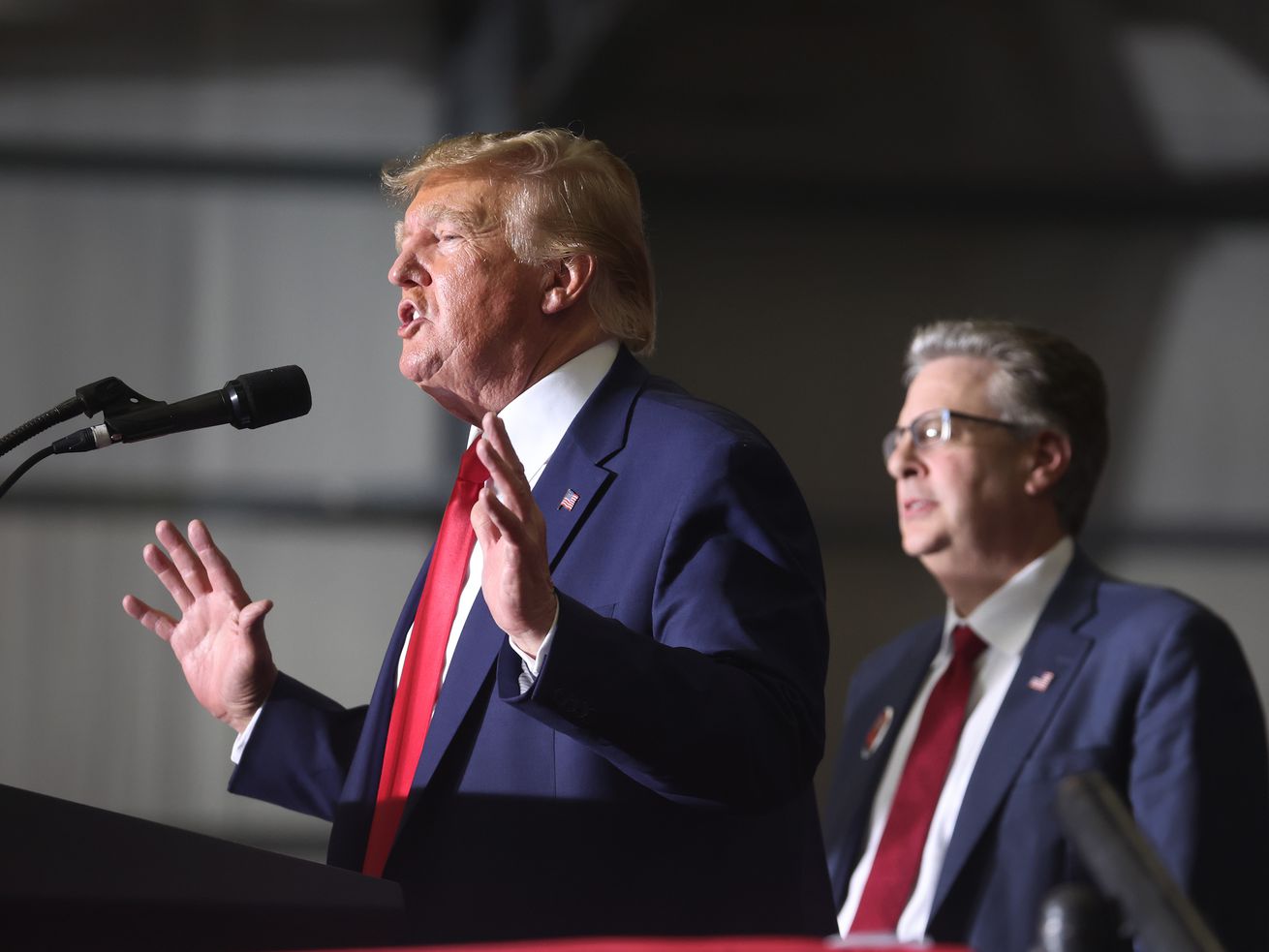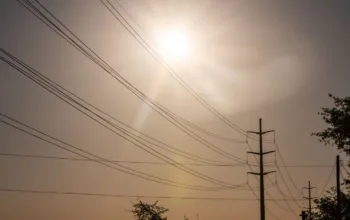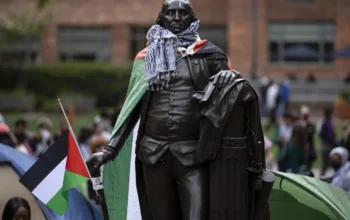Michigan is an early test of the political potency of Trump’s election lies.
This should be a terrific election year for Michigan Republicans. There is deep angst in Michigan, as with the rest of the nation, over inflation and an unpopular Democratic president who only narrowly won the state in 2020. With Democrats facing headwinds, Republicans across the country have an advantage that they’re eager to capitalize on.
But an internal fight between the state Republican Party establishment and the most die-hard Donald Trump supporters is threatening the prospects of GOP candidates in Michigan taking over some statewide offices.
With just over half a year to go until the general election, the divide here mirrors the one that is playing out in GOP primaries across the country. As Trump allies hone in on Michigan and other swing states to install officials who are election denialists, some Republicans worry that fixating too much on Trump and his falsehoods about the 2020 election is a recipe for disaster, especially in swing states like Michigan. The trouble is, that’s exactly what the vocal pro-Trump faction of the Michigan GOP — and its preferred candidates — want to focus on.
It’s all coming to a head on Saturday, when the Michigan GOP will hold its endorsement convention in Grand Rapids and hash out those differences in a public forum, as opposed to behind the shroud of a voting booth, well before most other primaries on the 2022 calendar.
Two Trump-endorsed candidates are being considered for statewide office nominations: Kristina Karamo for secretary of state and Matt DePerno for state attorney general. Karamo, who became known in right-wing media as a 2020 election “whistleblower” for her baseless claims of fraud, is seen as the Republican frontrunner and would face incumbent Democratic Secretary of State Jocelyn Benson in the general election. DePerno has a tougher contest against his main Republican rival, former speaker of the Michigan House Tom Leonard, to earn a chance to defeat incumbent Democratic Michigan Attorney General Dana Nessel.
The outcome will feed into the mounting questions about Trump’s power as a kingmaker. And if his chosen candidates do win, that will also set up a test of the political potency of Trump’s election lies and whether candidates in his mold like Karamo and DePerno will be successful in a general election.
Few Republicans in Michigan have publicly voiced problems with Trump or his false claims about the 2020 election being rigged. But while some state party leaders have lined up behind Trump-backed candidates who have made the 2020 election their focus, others have publicly discouraged them from dwelling on the subject for fear of turning off key voting blocs in November.
The party has already gone all-in on Trumpism, but they are still divided over whether to run on his election lies — and are waiting for Saturday to get answers on just what their strategy should be.
How Michigan’s nomination process works
Unlike in other states, Michigan doesn’t hold primaries to determine the nominees for state offices like the attorney general, secretary of state, the Michigan Supreme Court, the State Board of Education and university boards. Party delegates nominate their candidates for those positions at a convention in August. (The nominees for other statewide races, including the governor’s race, will be determined in an August 2 primary.)
But for the first time, the Michigan GOP is also holding an endorsement convention on April 23. Some 2,500 delegates were chosen at the county level to attend that convention, where they will vote on who will receive the GOP endorsement before the party formally nominates them in the summer. The intention is to help their candidates gain more momentum and fundraise by putting the weight of the party behind them at an earlier stage in the cycle.
The level of disarray currently plaguing the Michigan GOP became apparent last week at a handful of county party conventions where those delegates were chosen.
DePerno — who argued in court for additional independent audits of the 2020 election results as recently as last week — had called upon his supporters to “storm the convention” and run for delegate positions or to become alternates in order to shore up the chances of pro-Trump candidates. Many of them did, resulting in raucous gatherings.
But they weren’t successful in Macomb County, the only county in the Detroit metro area that went red in 2020, where Trump supporters resorted to cursing and yelling as the pro-Trump county party chair was overthrown.
I watched the absolutely unhinged Macomb County GOP convention so you don’t have to. Beloved Trumper Mark Forton was overthrown, with Eric Castiglia taking over as Chair. The meeting devolves into cursing & anger, one woman yelling, “You’re all for the New World Order! Fuck you!” pic.twitter.com/6WsTMt8IYx
— Left of Center MI (@leftofcentermi) April 12, 2022
It hasn’t helped that some party leaders have waded into the fray. Michigan GOP co-chair Meshawn Maddock has endorsed Karamo and DePerno, breaking with custom that party leaders don’t get involved at this stage of the nomination process. The state party, for its part, has sought to distance itself from Maddock’s choice to endorse, clarifying that she was acting in a personal capacity.
“Having these two champions, Karamo and DePerno, in office will ensure that we stop stolen elections and they will be important to a real forensic audit of the 2020 election,” Maddock said in a statement in March.
Gustavo Portela, a spokesperson for the state party, dismissed tensions at the conventions as nothing out of the ordinary, arguing that all members of the Michigan GOP are focused on winning.
“People don’t want to move backwards, they want to move forward. And they don’t want to repeat the same mistakes of the past. We, as a party, understand that,” Portela said.
But DePerno and Karamo clearly have their eyes trained back on 2020 — an electoral strategy that some in the GOP think could alienate voters they need to defeat Democrats.
“[The Michigan GOP] may want to look to 2022. But their own candidates are not,” said Richard Czuba, president of the Michigan polling firm Glengariff Group.
Michigan Republicans are all in on Trump, but divided on electoral strategy
This is not the first time that the Michigan GOP has dealt with an insurgency.
In the 1980s, it was the Christian right in working-class communities around Detroit led by the televangelist Pat Robertson, who pushed conservative social policies and rebuked both major parties. In 2010, it was the Tea Party movement, which sought to advance a populist brand of small-government libertarianism focused on lowering taxes and stopping the Affordable Care Act.
But in those cases, the battles among Michigan Republicans were more about ideology and less about a singularly dominant personality like Trump, who has sought to punish members of his own party who defied him in refusing to challenge the results of the 2020 election. And this time, the establishment is largely falling into line.
“The Trump faction of the Republican Party in Michigan [is] the establishment now,” Czuba said.
Darrin Camilleri, a Democrat running for the Michigan Senate who currently represents a state house district that Trump won, said that the GOP only has itself to blame for allowing that to happen.
“The Republican Party in Michigan decided to embrace conspiracists and embrace the Big Lie. And I think that the establishment Republican Party is going to pay the price,” he said. “They are very quickly being taken over by people who do not believe in facts and who are even willing to call each other communists and radical liberals and fake Republicans at their own county conventions.”
Karamo rose to prominence in 2020 as a poll watcher who falsely claimed that she had seen votes switched from Trump to Biden and that Trump had won Michigan. She is widely expected to win her party’s endorsement.
DePerno is more of a longshot. He has called for a “forensic audit” of the 2020 election results in Antrim County, Michigan, though a Republican-led state Senate panel already found no evidence of widespread fraud after months of investigation. But Leonard, his Republican opponent, has deep ties to the Michigan GOP and was also nominated by then-president Trump in 2019 to become a US attorney in Michigan, though was never actually confirmed.
“If Donald Trump cannot deliver this nomination, it sends a message across the Republican Party, across the nation, that, in fact, he’s toothless. But if [DePerno] does win this nomination, it sends a message that you better get in line behind what Donald Trump wants, or he will do to you what he’s doing to the old establishment of the Michigan Republican Party right now,” Czuba said.
But Jeff Timmer, a Republican strategist in Lansing and senior adviser at the Lincoln Project, argued that if DePerno loses, it will not be a reflection of Trump’s waning clout, but rather a signal that Leonard was able to sufficiently tie himself to the former president. Either way, no one should underestimate Trump’s influence going forward, he said.
/cdn.vox-cdn.com/uploads/chorus_asset/file/23406369/GettyImages_1389194566.jpg)
Scott Olson/Getty Images
“If they need any more evidence that Donald Trump’s strength is growing since he left the White House, this will only reinforce that and it should dispel the notion that there is a post-Trump Republican party,” Timmer said.
Becoming the party of Trump isn’t costless, however — particularly in a purple state won and lost by thin margins. A January survey by the Glengariff Group found that only about 20 percent of Michigan independents viewed Trump favorably. Though many Republicans have tied their fates to Trump nationally, Trump’s unpopularity might make that a risky strategy in Michigan.
Can the Michigan GOP present a unified front by November?
Michigan Republicans are confident that they can navigate differences within their party and unite against Democratic incumbents.
“We look forward to being united behind the candidate that emerges from our state convention,” Portela said. “No matter who that is, we believe that that candidate is going to be better than [Secretary of State] Jocelyn Benson, than [Attorney General] Dana Nessel. That’s what the party is focused on this fall.”
The zealousness of Trump supporters might have made the confrontations at the county party conventions particularly acrimonious, but it’s nothing Republicans haven’t seen before. During the Robertson insurgency, his supporters organized rump caucuses, large walkouts and loud protests at state party conventions and then, in 1988, they unified to elect George H.W. Bush as president. The same is likely to happen this time around, Czuba said.
The state party is already making some moves to mollify those still amped up over election fraud charges, even if it would rather not make them the primary focus of the party platform. For instance, the party has endorsed a ballot initiative called “Secure My Vote,” which would require voters to provide identification, prevent mass mailing of absentee ballot applications and restrict election funding by private groups.
“They have to embrace that rhetoric or they’re going to lose their base, their small-dollar donors, the enthusiasm that they’re trying to create in the grassroots elements of the party,” Timmer said. “They represent a minority of Michigan voters and they have to have outsized enthusiasm in order to win races.”
Michigan Republicans will have to balance appeasing their base with nominating candidates that will actually be competitive in the general election. The endorsement and nomination process, particularly given DePerno’s call to action, could yield candidates that are too ideologically extreme to win over independents.
“It’s really hardcore activists who show up to these conventions,” Camilleri said. “So you’re going to pick the most hardcore of the candidates to put up on on the general election for November. Regular voters do not believe what these hardcore right wing Republicans like DePerno and Karamo believe about our democracy and rule of law.”
The outcome of the state nomination process could have political consequences. Trump isn’t popular in Michigan and neither are the candidates he’s endorsed compared to their Democratic rivals: in the January Glengariff Group survey, Benson led Karamo by 14 percentage points and Nessel led DePerno by 10 points. (Nessel also led the other GOP hopeful Leonard by 6 points.)
“The grassroots is highly motivated right now behind Donald Trump and re-litigating 2020. That’s not the case with independents and Democrats,” Czuba said. “Republicans can’t get out of their own way to focus on 2022.”
Author: Nicole Narea
Read More



